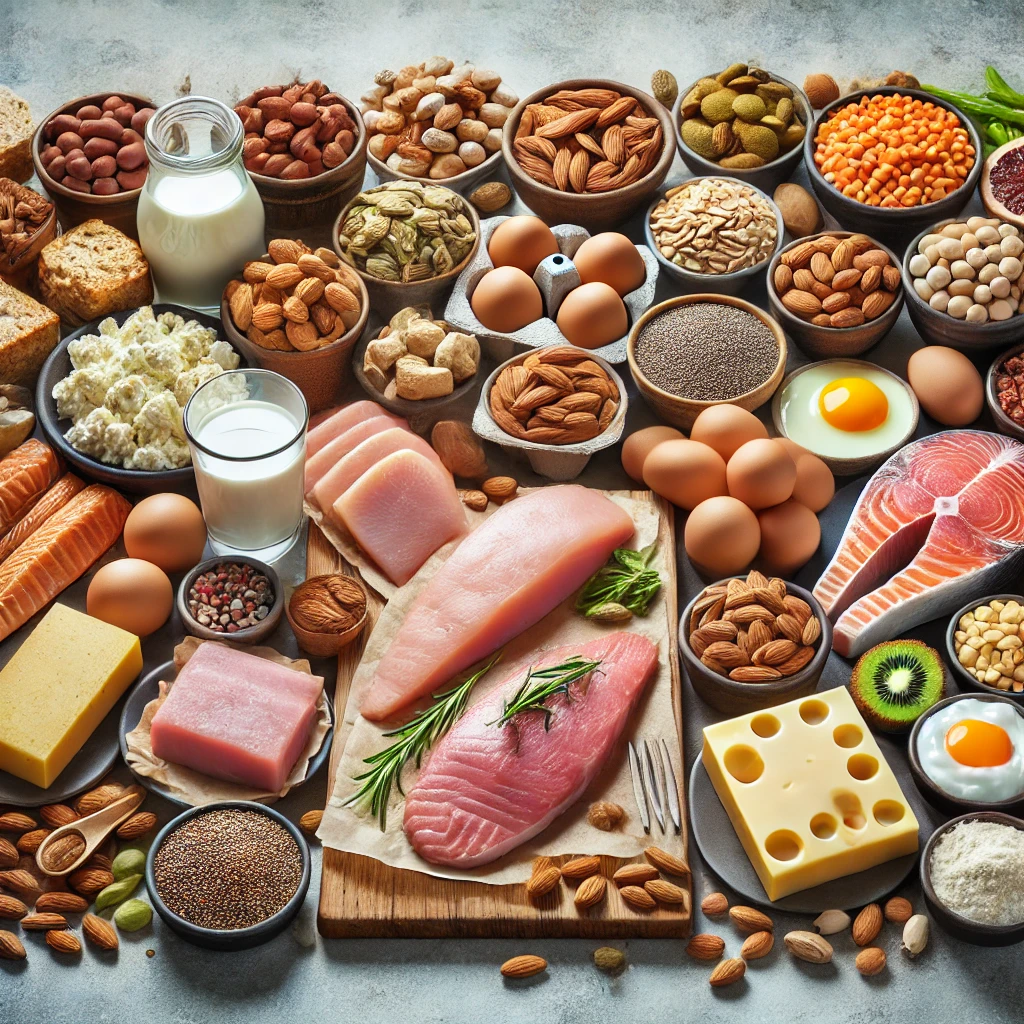5% OFF BY SUSCRIBING TO OUR NEWSLETTER
The Importance of Protein for Athletes: A Complete Guide

Alexandre Adamczewski

Whether you are a professional athlete or a sports enthusiast, proteins play a crucial role in your diet. They are not only essential for muscle growth and repair, but they also have a significant impact on your performance and recovery. In this article, we will explore in-depth the importance of proteins for an athlete and how to effectively incorporate them into your routine.
Proteins: What are they?
Proteins are macromolecules made up of chains of amino acids. These are the building blocks of your muscles, skin, hair, and many other body tissues. There are 20 types of amino acids, 8 of which are considered “essential” in adults and 9 in children because your body cannot produce them on its own; they must therefore be obtained through food.
Why are proteins important for athletes?
-
Muscle Repair and Growth
During intense physical exercise, muscle fibers undergo micro-tears. Proteins are necessary to repair these tears and rebuild muscles stronger than before. Without adequate protein intake, this recovery process is slowed, which can hinder your progress and performance. -
Preservation of Muscle Mass
During prolonged efforts, such as resistance training or intense cardio, your body may use protein reserves for energy. This can lead to muscle loss. Sufficient protein intake helps prevent this muscle catabolism (muscle breakdown) and promotes the maintenance of muscle mass. -
Strengthening the Immune System
Proteins are also essential for the proper functioning of the immune system. Antibodies, which protect the body from infections, are made of proteins. By providing your body with high-quality proteins, you ensure that your immune system functions optimally, which is crucial for an athlete who puts intense strain on their body.
When should you consume protein?
Protein intake is not limited to a specific time of day. However, certain periods are particularly important to maximize their effectiveness.
- Before Training
Consuming protein before a workout can provide your body with the necessary amino acids to support physical effort and prevent muscle breakdown. A small, protein-rich snack 1 to 2 hours before training is recommended. - After Training
One of the most crucial windows for consuming protein is immediately after a workout. This period is called the “anabolic window,” during which the body is particularly receptive to nutrients to repair and rebuild muscles. It is recommended to consume a source of protein within 30 to 60 minutes after exercise. - Throughout the Day
It is also important to distribute your protein intake throughout the day to maintain stable energy levels and avoid hunger spikes. This promotes better protein synthesis and faster recovery.
How much protein does an athlete need to consume?
Protein needs vary depending on the type of physical activity, the intensity of training, and personal goals.
In general:
- For moderately active individuals or those practicing endurance sports, the recommendation is around 1.2 to 1.7 grams of protein per kilogram of body weight per day.
- For strength athletes or those aiming to build muscle mass, this may increase to 1.5 to 2.5 g/kg/day.
The best sources of protein for athletes
There are many food sources of protein, both animal and plant-based. Here are some of the best ones:
Animal Proteins
-
Fish: Salmon, tuna, sardines, rich in protein and omega-3 fatty acids, which are also beneficial for heart health.
-
Lean meats: Chicken, turkey, lean beef, which are rich in high-quality proteins.
-
Eggs: A complete source of protein, containing all essential amino acids. One egg contains about 6g of protein.
-
Dairy products: Yogurt, cottage cheese, milk, which are rich in protein and calcium.
Plant Proteins
-
Legumes: Lentils, chickpeas, black beans, are plant-based sources rich in protein.
-
Tofu and tempeh: Excellent sources of plant-based protein, especially for those following vegetarian or vegan diets.
-
Nuts and seeds: Almonds, chia seeds, sunflower seeds, offer a good supply of protein and healthy fats.
-
Whole grains: Quinoa, brown rice, oats, which contain significant amounts of protein.
Protein supplements
Protein supplements, such as protein powders (whey, casein, soy, etc.), are often used by athletes to achieve their nutritional goals.
At Ledvard, we have Recovery3, the ideal solution for post-workout recovery. Recovery3 is a dietary supplement designed to optimize recovery after exercise for athletes. Thanks to its formulation, it combines fast-acting carbohydrates (maltodextrins) to replenish energy stores, milk proteins (whey) to promote muscle repair, and essential minerals (potassium, magnesium, calcium) to ensure effective rehydration and reduce fatigue. It also contains antioxidants and natural anti-inflammatory agents (ginger, annatto seeds, vitamin C) to reduce oxidative stress and prevent the onset of muscle soreness.
Conclusion: Protein, Essential for Athletic Performance
In summary, protein is essential for athletes not only to promote muscle repair and growth but also to optimize performance, recovery, and overall health. By adjusting your protein intake according to your type of physical activity and your goals, you ensure that your body has the best tools to achieve optimal performance.
So, remember: incorporate a variety of protein sources into your meals and snacks throughout the day to maximize your results and maintain strong health.
Sources :
Agence Nationale de Sécurité Sanitaire de l’alimentation, de l’environnement et du travail (ANSES) – Recommandations sur les apports en protéines. L’ANSES conseille un apport en protéines compris entre 0,83 à 2,2 g/kg de poids corporel pour un adulte de moins de 60 ans.
American College of Sports Medicine (ACSM) – Recommandations sur l’alimentation et la nutrition pour les athlètes. L’ACSM conseille un apport en protéines compris entre 1,2 à 2,0 g/kg de poids corporel, en fonction de l’intensité de l’exercice (source : Position Stand on Nutrition and Athletic Performance).
International Society of Sports Nutrition (ISSN) – Une position sur l’importance des protéines pour les sportifs. L’ISSN recommande un apport de protéines accru pour soutenir la récupération musculaire et la préservation de la masse musculaire, en particulier lors d’entraînements de haute intensité (source : Position Stand: Protein and Exercise).
Journal of the International Society of Sports Nutrition (JISSN) – Recherches approfondies sur les effets de l’apport en protéines sur la performance et la récupération après l’exercice, notamment le rôle de la fenêtre anabolique post-entraînement (source : Journal of the International Society of Sports Nutrition).
Academy of Nutrition and Dietetics – Recommandations sur la nutrition pour les sportifs, incluant l’importance des protéines pour la réparation musculaire et le maintien d’une bonne santé immunitaire (source : Nutrition and Athletic Performance).
WebMD – Conseils pratiques sur les meilleures sources alimentaires de protéines, qu’elles soient animales ou végétales, pour un apport optimal dans un régime sportif (source : Protein: How Much Do You Need?).
PubMed Central – Études scientifiques sur les bienfaits des protéines pour les athlètes et la meilleure manière de les consommer pour maximiser les gains musculaires et la récupération (source : Effect of Protein Supplementation on Muscle Mass and Strength in Adults: A Systematic Review).


